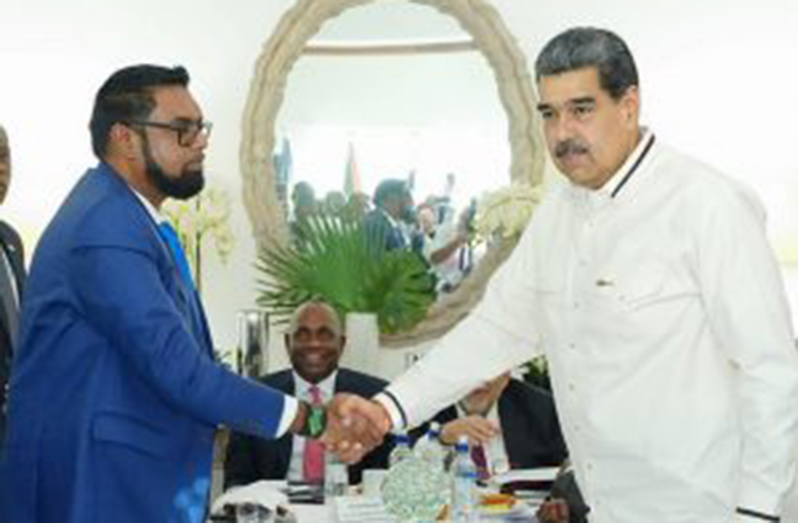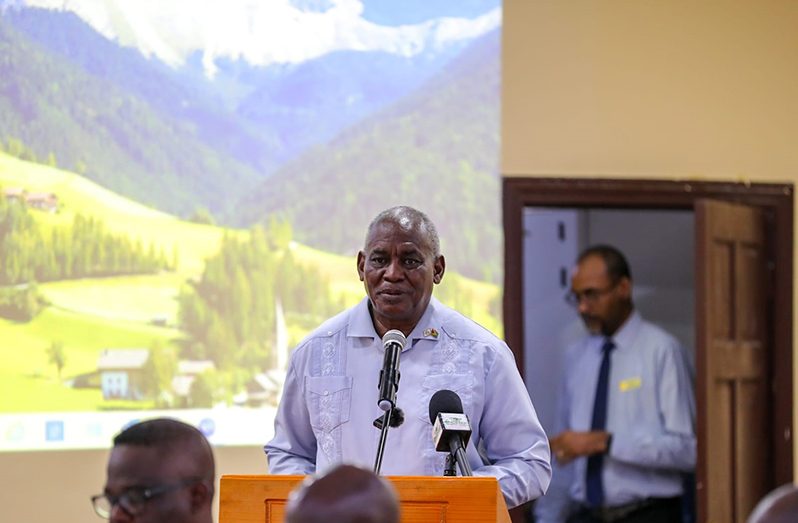-says move is ‘highly regrettable’, violation of Argyle Declaration
HOME AFFAIRS MINISTER, Robeson Benn has expressed deep concerns over Venezuela’s persistent disregard for the Argyle Declaration regarding Guyana’s Essequibo territory, which he said is “deeply regrettable.”
The backdrop to Benn’s remarks stems from recent developments in Venezuela, where lawmakers allied with President Nicolás Maduro approved the creation of a new state in Guyana’s resource-rich Essequibo region.
Despite ongoing international court proceedings, Venezuela has asserted its right to govern the territory, citing a December referendum as justification.
Speaking during the opening of a conference of the Caribbean Community (CARICOM) Regional Security System, on Friday, at the Ramada Hotel, Benn highlighted Guyana’s commitment to resolving the issue through legal means.
“We are unhappy that the Government of Venezuela and its National Assembly just Thursday agreed that they will make Essequibo no longer a Zona de Reclamación but Venezuelan territory.
“This is highly regrettable, and it is in violation of the principles of the good faith discussions which were undertaken at Argyle and more lately in Brazil,” he said.
Benn reiterated Guyana’s stance that the matter would be settled in the courts, expressing confidence that Guyana would be vindicated through this process.
He emphasised the risks and challenges posed by Venezuela’s actions, particularly highlighting the presence of non-state actors, such as remnants of the Revolutionary Armed Forces of Colombia (FARC) and the National Liberation Army (ELN) which are two prominent guerrilla groups involved in the Colombian conflict.
Minister Benn pointed out that FARC and the ELN are supporting the Venezuelan’s “sindicatos” or “malandros” who are involved in drug trafficking, Trafficking in Person (TIP) and illegal mining.
“In relation to the Guyana/Venezuela issue, that is a matter which will be resolved in the courts. We, of course, expect that Guyana will be vindicated through that process, but, we know the risks.
The International Court of Justice (ICJ) is tasked with resolving the territorial controversy, yet Venezuela has expressed reluctance to acknowledge the court’s jurisdiction.
Despite this, Guyana remains steadfast in its position, asserting that its borders are non-negotiable and reaffirming its sovereignty over the region.
“We know the challenges which are in Venezuela, and we are concerned about the questions of instability, particularly in the presence of non-state actors in eastern Venezuela, particularly on our borders,” Benn said.

PROTECTING MIGRANTS
The minister also underscored Guyana’s dedication to protecting Venezuelan migrants within its territory, stressing the mutual relationship between the two countries.
He stated that Guyana does not harbour any territorial ambitions towards Venezuela and remains committed to fostering peaceful relations.
“Guyana does not have any designs on Venezuelan territory. Guyana provides support to perhaps more than 30,000 registered Venezuelan persons in our territory.
“We still view Venezuelans as our cousins,” Benn stated, while highlighting Guyana’s humanitarian efforts towards Venezuelan migrants.
The Minister said that as Guyana continues to deplore the recent situation, it looks forward to “reasonable rational conversations and engagements” to make sure that the issue between Guyana and Venezuela is mitigated and poses no risk to either territory.
He reaffirmed that the Caribbean Community (CARICOM) region must remain a ‘zone of peace’ in relation to this issue.
Venezuela’s unilateral actions have sparked condemnation from Guyana and its allies, including support from regional partners within CARICOM and further afield.
Benn commended the backing of international partners, including the United States, the United Kingdom, the European Union, and Brazil, for their support in upholding Guyana’s sovereignty.
“The controversy, which was dissolved in 1899, full, perfect and final and only came into some issue when a letter obtained from the crypt suggested that something unusual unwarranted and improper happened,” Benn said, referencing the historical context of the dispute.
COMPLEX SITUATION
The creation of the new state, named ‘Guayana Esequiba’, by Venezuela, adds another layer of complexity to the longstanding territorial dispute. The law establishing the new state delineates its borders, encompassing Guyana’s territory.
Venezuela, last year, had increased claims to two-thirds of Guyana’s Essequibo region.
This area is known for its wealth in oil, timber, and other natural resources, drawing attention and contention from both sides.
In 2018, Guyana took a decisive step by approaching the ICJ seeking affirmation of the award’s legitimacy.
Venezuela, taking a defiant stance, initially claimed that the ICJ lacked jurisdiction, a contention flatly rejected by the World Court in a crucial ruling in December 2020.
The door was thus opened for the ICJ to delve into the merits of the substantive case.
The substantive case which highlights the historical context and the 1899 Arbitral Award, remains before the World Court.
In response to Venezuela’s actions, Guyana has been bolstering its defence and diplomatic efforts with the help of international partners, including the United States, aiming to counter security threats while promoting regional stability.
Despite these preparations, Guyanese officials have reiterated their focus on defence rather than offence.
Following Venezuela’s reaction to the docking of the British offshore patrol vessel, HMS Trent, in Guyana’s waters, President Dr. Irfaan Ali clarified the nation’s defensive posture, indicating no intent to initiate conflict with Venezuela.
Amid these tensions, a significant diplomatic effort led by Prime Minister Dr. Ralph Gonsalves of St. Vincent and the Grenadines culminated in a peaceful ‘Argyle Declaration’ between Guyana and Venezuela.
This agreement, reached during a historic meeting on December 14, 2023, includes both countries committing to avoid the use of force, and advocating for dialogue and co-operation to prevent tensions.



.jpg)










